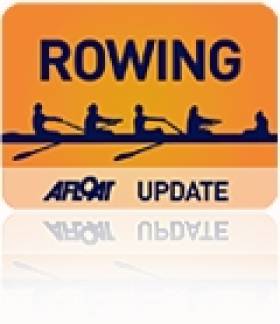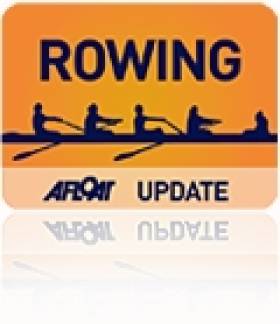Displaying items by tag: Irish Trials
Ireland Trial Cancelled
#Rowing: The Irish Trial scheduled for Saturday, December 23rd, has been cancelled. The organisers found they could not access adequate medical cover at the National Rowing Centre on the day and abandoned in the interests of health and saftey.
# ROWING: Padddy Hegarty of Skibbereen and Bridget Jacques of Belfast Boat Club topped the rankings among the junior athletes at the Irish Trials in the National Rowing Centre in Cork. The announcement of results and the squads for the World Junior Championships and Coupe de la Jeunesse was delayed for hours after a computer problem. There were a number of queries of the original selection and changes were made. A decision on Home International squads will be made in the coming weeks.
Time Trial, National Rowing Centre (Selected Results)
Men - Senior/Under-23/Lightweight single sculls and pairs (1900 metres; ranked on per centage of projected world best time for each class). Selected Results.
1 P O’Donovan (lightweight) 6 mins 40.85 (94.8 per cent), 2 G O’Donovan (lwt) 92.7, 3 J Keohane (heavyweight) 6:40.76 (92.4), S O’Driscoll (lwt) 6:52.87 (92.0), 5 F McQuillan-Tolan/S O’Connor (heavyweight pair) 6:25.33 (91.2), 6 D Neale (hwt) 6:46.49 (91.1), 7 L Prendergast (lwt) 7:04.10 (89.6), 8 J Mitchell/M Wray (hwt pair) 6:35.16 (89.0), 9 A Burns (lwt) 7:07.79 (88.8), 10 A Boreham (hwt) 7:04.84 (87.2).
Junior
Men – (chosen for World Championships and Coupe squad):
Single Sculls: 1 P Hegarty (Skibbereen) 6:52.9 (95.26), A Harrington (Shandon) 6:55.9 (94.56), 3 D O’Malley (St Michael’s) 6:57.9 (94.11), 4 J Mitchel (Lee) 7:01.0 (93.42), 5 C Carmody (Shannon) 7:01.7 (93.26), 6 J Casey (Shandon) 7:02.8 (93.0), 7 M Ryan (Skibbereen) 7:06.5 (92.21), 8 R O’Sullivan (Lee) 7:09.5 (91.5), 9 E Stone (Lee) 7:09.5 (91.12), 10 S Murphy (Cork BC) 7:12.2 (91.0), 11 G McKillen (RBAI) 7:12.5 (90.93), 12 W Yeomans (Commercial) 7:15.7 (90.27), 13 D Buckley (Lee) 7:16.8 (90.05).
Pairs: 1 K Fallon, J Smyth (St Joseph’s) 6:44.3 (92.81), 2 D Keohane, B Keohane (Presentation) 92.5, 3 C Hennessy, L Carroll (Shandon) 6:50.3 (91.74), 4 E Murray, K Anderson (Portora) 90.86.
Women - (chosen for World Championships and Coupe squad):
Single Sculls: 1 B Jacques (Belfast BC) 7:43.1 (93.14), 2 H Shinnick (Fermoy) 7:55.4, 3 F Murtagh (Galway RC) 7:55.5 (90.70), 3 B Walsh (Skibbereen) 7:56.1, 4 L Hamel (Cork BC) 7:58.4 (90.15), 5 M McClaughlin (Cork BC; jun 17) 8:02.0 (89.48), 6 P Mulligan (Portora) 8:04.2 (89.07), 7 E Barry (Bann, jun 16) 8:09.4 (88.13), 8 C Beechinor (Cork BC, jun 16) 8:09.6 (88.09), 9 K O’Connor (Muckross, jun 16) 8:17.0 (86.78), 10 E Lambe (Commercial, jun 16) 8:17.2 (86.74), 11 L Kilbane (Cork BC, jun 16) 8:17.3, 12 Z Hyde (Killorglin, jun 16) 8:19.2 (86.39).
Pairs: 1 R Gilligan/L McHugh (Shannon) 7:51.5 (87.85); 2 C Scannell/D Callanan (Shandon) 7:55.9 (87.03)
Group B (Trials for Home International) – Winners: Junior Men - Pairs: R McKenna, A Chadfield (Clonmel) 6:49.9 (91.56). Single: D Synnott (Lee) 7:20.4 (89.3). Junior Women – Pairs: V Sheehan, Z Madden (St Michael’s) 7:40.2 (89.99). Single: C Kelly (Carrick-on-Shannon) 88.68.
O'Donovan Impressive at Irish Rowing Trials
# ROWING: John Keohane was the fastest man at the Ireland Trials at National Rowing Centre in Cork today. However, the Lee Valley heavyweight was just nine hundredths of a second ahead of lightweight sculler Paul O’Donovan in the Time Trial. The 19-year-old from Skibbereen was assessed to have a percentage of world’s best time in his grade of 94.8 per cent – albeit with a strong tail wind. The conditions were forecast to deteriorate as the day went on and on-the-water work was done early in the morning.
Time Trial (Selected Results)
Men - Senior/Under-23/Lightweight single sculls and pairs (1900 metres; ranked on per centage of projected world best time for each class). Selected Results.
1 P O’Donovan (lightweight) 6 mins 40.85 (94.8 per cent), 2 G O’Donovan (lwt) 6:50.10 (92.7), 3 J Keohane (heavyweight) 6:40.76 (92.4), S O’Driscoll (lwt) 6:52.87 (92.0), 5 F McQuillan-Tolan/S O’Connor (heavyweight pair) 6:25.33 (91.2), 6 D Neale (hwt) 6:46.49 (91.1), 7 L Prendergast (lwt) 7:04.10 (89.6), 8 J Mitchell/M Wray (hwt pair) 6:35.16 (89.0), 9 A Burns (lwt) 7:07.79 (88.8), 10 A Boreham (hwt) 7:04.84 (87.2).































































